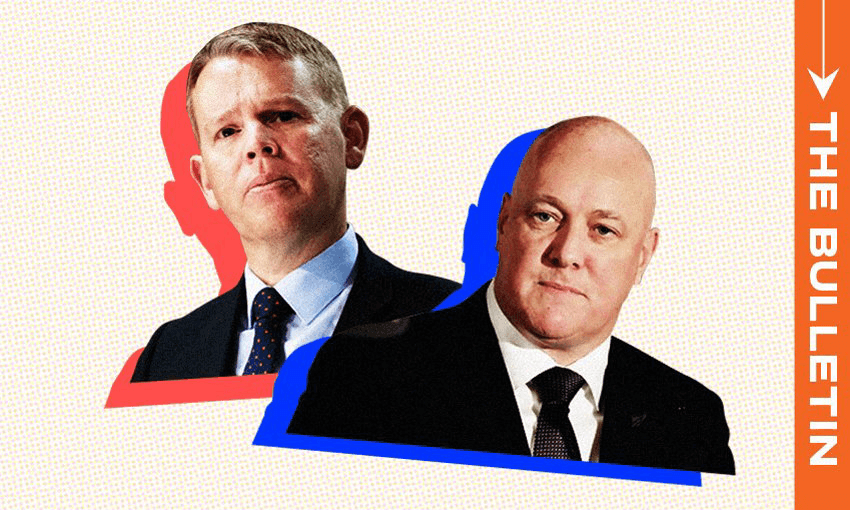With neither party offering a compelling vision, the surge in support for minor players suggests the era of two-party dominance is fading, writes Catherine McGregor in today’s extract from The Bulletin.
To receive The Bulletin in full each weekday, sign up here.
Polls show a race too close to call
Two new political polls show Labour and National all but locked in a statistical dead heat, and Christopher Luxon facing his weakest numbers yet as prime minister. In Monday’s Curia/Taxpayers’ Union poll, Labour edged ahead to lead National by almost two points, while the 1News Verian poll released later that day had Labour surging four points to 33%, just one point behind National.
Both polls had Luxon at or near his lowest preferred-PM rating since taking office, with Chris Hipkins closing to within a single point. In The Post (paywalled), Andrea Vance notes that Labour has now led the party vote in five of the last 11 public polls, with one tie. That 50/50 split in support “is deeply troubling for a first-term government”, Vance writes. Even more striking is the continued erosion of the centre: roughly a third of voters are now opting for minor parties, most notably New Zealand First, whose support has surged since January.
National’s leadership problem
It’s not just the polls that are putting Luxon’s leadership under pressure. Stuff’s Joel Maxwell is one of a number of commentators arguing that the CEO turned PM has failed to get much of note accomplished. Just look at the government’s flagship projects, says Maxwell: they’re largely recycled from what he calls the “positively audacious” last National government. “Whatever you think about big roading projects, Previous National could get stuff done.”
Perhaps worse is Luxon’s inability to handle his coalition partners, says 1News’ John Campbell. He points to the defeat of the Treaty Principles Bill – “the most brutal, embarrassing and unequivocal defeat of a government bill I can recall in three decades” – as emblematic of a government that promised “managerial prowess” but is struggling to deliver. “There has never been a one term National government or National-led government. Ever,” he writes. “And the fact that it’s even a possibility now tells us the Nats aren’t delivering what voters want.”
So what does that augur for Luxon’s future? Vance warns that “self-preservation is a powerful motivator” for National MPs and as the polls continue to disappoint, speculation about his leadership is “starting to reach fever pitch again”.
Labour’s cautious drift
“Labour will be chuffed with [their polling],” Campbell writes. “Particularly given how little they’ve done to earn it.” Hipkins’ strategy of standing back and letting the government dig itself into a hole has worked to a point – but at the cost of a clear narrative about Labour’s own vision. Campbell jokes that there have been “more sightings of Elvis than of significant new Labour Party policy”, and notes that the party’s online “Announcements” section recently displayed nothing at all.
Vance is less critical, noting that Labour’s “low-risk, low-effort” approach is successfully “starving National of policy to attack while letting the government absorb the heat”. The problem for Labour is that without a bold offer to voters, its success rests on National’s troubles rather than any genuine desire for a new Labour government.
A hollow political centre
Beneath the week-to-week polling, the bigger problem for both parties is a deep voter malaise. Maxwell calls the coalition’s approach “zombie politics” – ministers “desperately trying to look busy till 5pm, or the next election”, resorting to “distractions” like ginned-up culture wars without addressing voters’ most pressing needs. Meanwhile Labour’s caution is leaving it absent from key debates.
As a result, more voters are supporting minor parties than any time since 2002. Or, as Campbell puts it, in his inimitable way, “the support calcification continues in what we call the centre, by which we really mean the old dogs. National and Labour, arthritic, teeth desperately in need of repair, long past chasing seagulls on the beach, surrounded by barking pup parties that increasingly do not defer to them, do not respect their threadbare ‘wisdom’, and do not know their place.” Unless one of the two “old dogs” can articulate and deliver a convincing plan, the drift to minor parties – and the erosion of the once-dominant political centre – looks set to continue.
Subscribe to NameEmail+Sign up to

